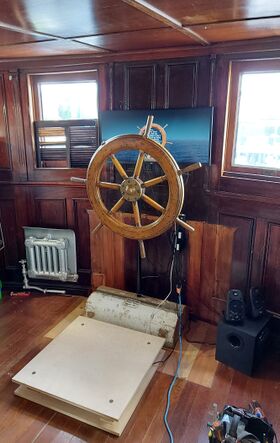Range Lights Interactive Museum Display: Difference between revisions
Ttenbergen (talk | contribs) No edit summary |
Ttenbergen (talk | contribs) No edit summary |
||
| (3 intermediate revisions by the same user not shown) | |||
| Line 1: | Line 1: | ||
{{Project | {{Project | ||
|shortDescription=A display where a ship's wheel controls a virtual ship on a screen to demonstrate how [https://en.wikipedia.org/w/index.php?title=Range_light Range Lights] work | |shortDescription=A display where a ship's wheel controls a virtual ship on a screen to demonstrate how [https://en.wikipedia.org/w/index.php?title=Range_light Range Lights] work | ||
|longDescription=The [[Selkirk Marine Museum]] asked us to set up a display about [https://en.wikipedia.org/w/index.php?title=Range_light Range Lights], maritime navigation aids that help a vessel stay in a channel. We set up an [[Interactive Display]] that uses an [[ | |longDescription=The [[Selkirk Marine Museum]] asked us to set up a display about [https://en.wikipedia.org/w/index.php?title=Range_light Range Lights], maritime navigation aids that help a vessel stay in a channel. We set up an [[Interactive Display]] that uses an [[Ship's wheel keyboard emulator | Ship's Wheel]] , which lets the user control a display created in [[Pygame]] on a [[Raspberry Pi]] that simulates steering a ship to bring it in line with a set of range lights. | ||
steering a ship to bring it in line with a set of range lights. | |geekery=We provided the [[Ship's wheel keyboard emulator]]. We generated the graphics for the islands, rudder indicator and messages, and designed and rendered the background wave video components for the game. We programmed the actual game in python and pygame. We set up the Raspberry Pi to boot to an update sequence that would read any required updates from a USB stick and then starts the game. | ||
|geekery= | |||
|skillSet=3D Modelling; 3D Printing; Arduino; Electronics; Graphic Design; Making; Programming; Python; Raspberry Pi | |skillSet=3D Modelling; 3D Printing; Arduino; Electronics; Graphic Design; Making; Programming; Python; Raspberry Pi | ||
|projectType=Interactive Display; Museum Display | |projectType=Featured Project; Interactive Display; Museum Display | ||
|northForge=No | |northForge=No | ||
}} | }} | ||
[[Category:Range Lights]] | [[Category:Range Lights]] | ||
[[Category:Raspberry Pi]] | |||
Latest revision as of 17:29, 2022 August 9
| Projects | |

| |
| Project: | Range Lights Interactive Museum Display (I) |
| Description: | A display where a ship's wheel controls a virtual ship on a screen to demonstrate how Range Lights work |
| Skillset(s) : |
3D Modelling • 3D Printing • Arduino • Electronics • Graphic Design • Making • Programming • Python • Raspberry Pi |
| Project Type(s) : | |
The Selkirk Marine Museum asked us to set up a display about Range Lights, maritime navigation aids that help a vessel stay in a channel. We set up an Interactive Display that uses an Ship's Wheel , which lets the user control a display created in Pygame on a Raspberry Pi that simulates steering a ship to bring it in line with a set of range lights.
How we did it
We provided the Ship's wheel keyboard emulator. We generated the graphics for the islands, rudder indicator and messages, and designed and rendered the background wave video components for the game. We programmed the actual game in python and pygame. We set up the Raspberry Pi to boot to an update sequence that would read any required updates from a USB stick and then starts the game.